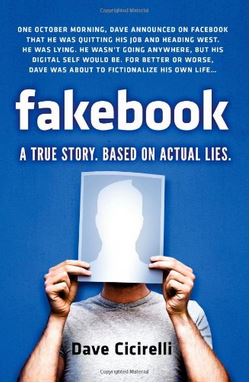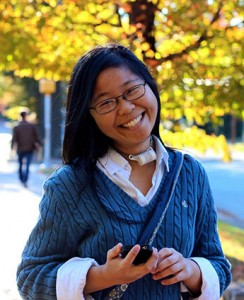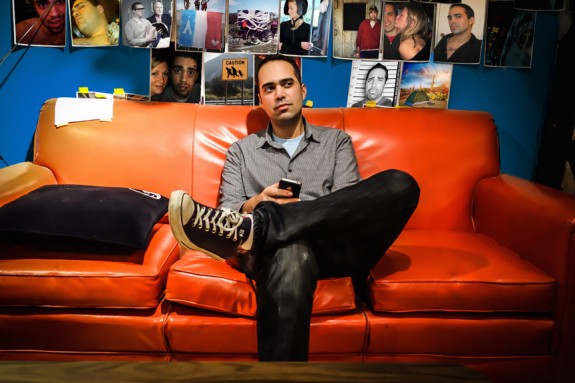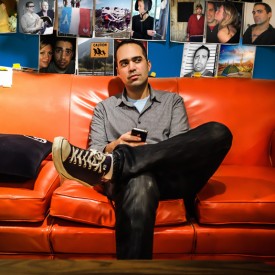What would you do if you followed updates on Facebook about a close friend who quit his job, traveled to the west and got tangled up in all sorts of mischief (including getting kidnapped by a religious cult and train hopping with a farmer’s daughter) – only to find out the whole thing was a hoax months later?
While most people use social media simply for networking, catching up with friends, racking up “Likes” on popular shared links and documenting important milestones, designer Dave Cicirelli used his Facebook account to reconstruct his entire life in 2009 at age 26.
In September 2013, Dave came out with a memoir, Fakebook: A True Story Based on Actual Lies, which includes several visual graphics mimicking Dave’s Facebook wall and the comments of people who read his statuses. The book chronicles the truth about how he created bogus images on Photoshop and developed the completely new character of “fake Dave” in order to trick hundreds of friends and relatives into believing he was something he wasn’t.
In this author Q&A, Dave gives us an inside look at how he developed Fakebook and what his joke-turned-social-experiment says about online social media personas and the relationships we create with not only other people, but also ourselves.
1) What inspired this social experiment? How did you plan out the way you presented your “adventures” to friends on Facebook?
In other words, ‘What on Earth was I thinking?!’ Ha ha.
I honestly still have a hard time answering this, because Fakebook didn’t begin with a big thesis statement. It was just a funny idea that made
me laugh, and continued to make me laugh as I imagined all these outrageous scenarios to put myself in. And part of me simply wanted to see how far I could take it before people stopped believing. But the more I thought about it, the more interesting and relevant the idea seemed.
At best, social media is an imperfect record. Every profile is partly fiction by virtue of choosing what to post and what to omit. So it struck me as an interesting and relevant twist to take this insight to its logical extreme. It was truly born out of a mix of curiosity and immaturity!
2) How did you first decide that you were going to write a book about this?
Over the six months [that] I did this, I was constantly being surprised by the experience. The need to write this book came from realizing I had a story to tell—one that was funny, personal, and an interesting lens to view how all of our lives are being affected by social media.
3) As an author, how do you craft a book like Fakebook? What does the creative process look like?
Procrastination, followed by panic, followed by writing!
Writing Fakebook was unique because I had a lot of content already created—the actual record of the hoax in the form of all the posts and comments. It already told a story, and acted as this structure [where] the real-life elements needed to be written around.
What was interesting is that as I looked back on these posts, well, I began to see recurring themes. I was able to sort of psychoanalyze myself, and realized I was working out issues in my real life through my fake one.
At that point, the central theme became clear: the relationship between self and reputation — and by extension, community. It was all there, in the interplay between on and off-line lives.
4) What were some of the challenges? What were the most rewarding parts?
I needed to make it believable that Fakebook was believable!
It’s easy to look at what I did from the outside and smugly think you would never fall for it. The story is absurd (especially when you compress six months of developments into 300 pages) and the Photoshop is terrible. But the fact of the matter is hundreds of people fell for it — from all walks of life and with all types of education and life experiences.
So I had to really explore why people believed it, and what I discovered is that people believed in it. At the heart of this story, I told this escapist fantasy that, on some level, we all share. It meant something to people. As a result, they wanted it to be true.
It was challenging to capture the audience’s investment in this story and the guilt I felt about it —while still convincing the readers that I’d keep doing it.
I’m really proud of the balancing act, and most of the people who were part of Fakebook seemed to really enjoy being a part of it. That’s really rewarding.
5) How do you think the visual elements of social media that you incorporated into Fakebook affected the storytelling?
I got to write a book with “extras.” All of the people who would comment on the posts became part of the story, and have their own character arcs in the background of the main narrative. You can choose to simply read the comments as just chatter, or you could get to know these people as the story goes on. Either way, they add a really unique texture I couldn’t have had otherwise.
And it also helped with one of the great central mysteries in the book—the person who figured it all out and anonymously toyed with me. In any other format I’d have to establish all the suspects in the main narrative. With this story, the audience had exactly what I had to go on—just the comments on my wall.
6) Your story says a lot about the way people are able to create identities for themselves online. Do you have any advice for first-time writers who want to make a leap with their big ideas and get published?
I think the secret of doing anything is simply doing it. With creative work, it’s impossible to predict any path to success, or where opportunities will come from. Just simply follow your own curiosities and commit to finishing what you started. Put out good work, and opportunities will come.
7) What’s next for you? I hear Ineffable Pictures has feature film rights for Fakebook now. Is there a movie in the making?
Yeah, the movie thing is pretty wild. As with all of these types of things, it remains the longest of long shots, but it’s a thrill to know that there are movie rights involving my dumb Facebook page! Whether the movie gets made or not, it still underscores the biggest thing I learned from doing and writing Fakebook — just start doing things and worry about what they turn into later!
Right now, I’m working on some personal art projects with no real plan on where they’ll go next. I started an Instagram feed called @TrashNYC, which is just a fun little side project about the garbage in New York. I also found some success with “Fake Banksy Sells Out,” a performance art project/video that went viral last fall. So I’m following it up with some fine art projects that are top secret!
And, of course, I continue to write. I have the rough outline of a fiction piece that I’m pretty excited about. Be sure to log onto fakebookfriends.com to stay in the loop!
Author Bio: Dave Cicirelli is a New York-based writer and art director with extensive experience serving iconic consumer and entertainment brands across all print, digital and experiential mediums. His work has won a number of awards, including a Silver Anvil, and honors from HOW Magazine, GDUSA and Creativity 38.
In the eight years he’s been in the marketing industry, Dave has witnessed the impact that social media has on how brands talk to consumers. In the 16 years since he got an AOL screen name, he’s witnessed the impact social media has had on how people talk to one another.
…………………………………..

DIY MFA Columnist Bio: As a recent graduate of UNC School of Journalism, Wendy Lu is a reporting intern for China.org.cn and content curator for Everyday Ambassador’s “Digital Detox” weekly series. Previously, she served as the managing editor of UNC’s Blue & White Magazine and print co-editor for The Durham VOICE. Wendy is also a former publishing intern at Sleepy Hollow Books and a NaNoWriMo 2008 winner. Her work has appeared in The Daily Tar Heel, Raleigh Public Record and Chapel Hill Magazine’s The WEEKLY. Learn more about Wendy at https://wendyluwrites.com.
Every month or two, DIY MFA’s Wendy Lu will be hosting “New Spin,” a column that covers everything that falls within alternative storytelling: literary mash-ups, books that put a new spin on classic stories, and “meta-books” that use new media, graphic illustrations, and interaction between words/design for an enhanced reader experience.








